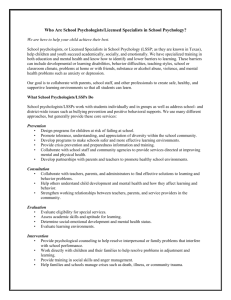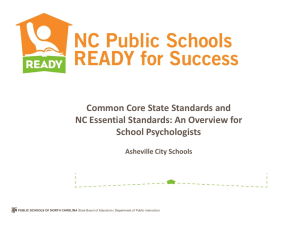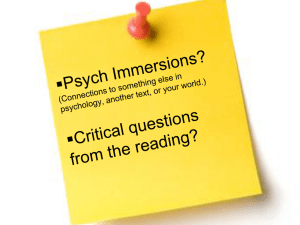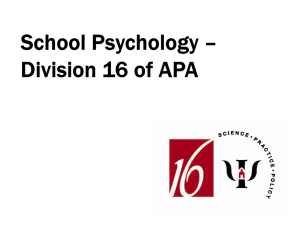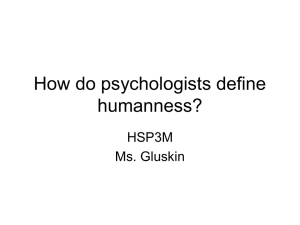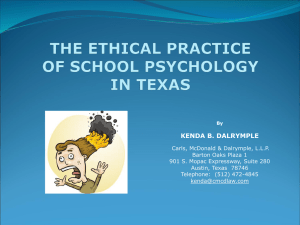tasp si ethics - Texas Association of School Psychologists
advertisement
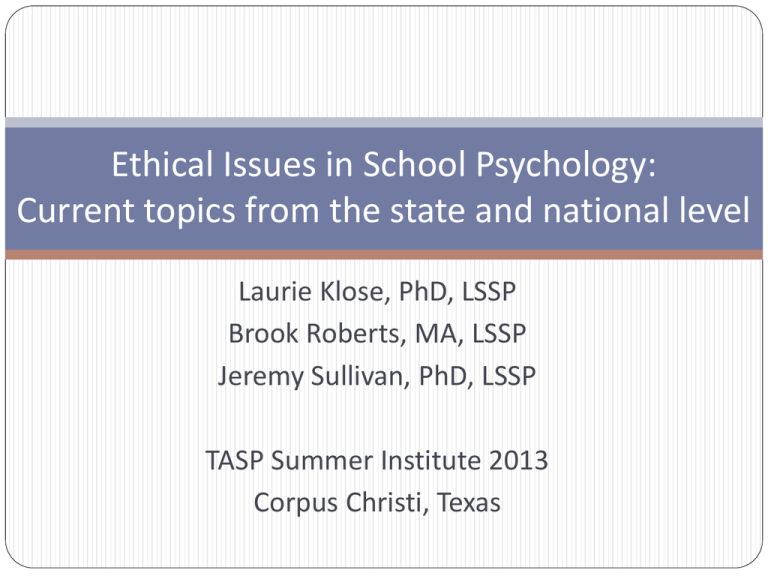
Ethical Issues in School Psychology: Current topics from the state and national level Laurie Klose, PhD, LSSP Brook Roberts, MA, LSSP Jeremy Sullivan, PhD, LSSP TASP Summer Institute 2013 Corpus Christi, Texas Learning Objectives Understand the nature of ethical issues that have been raised in inquiries or cases recently submitted to the NASP Ethical and Professional Practices Committee, university faculty and school based supervisors Apply accepted and evolving standards and principles to these issues; and Develop strategies for responding to these issues in an ethically appropriate manner. Format for today’s session Investigate recent national and state issues or individual local issues through group presentations Whole group discussion of relevant ethical issues related to cases and implications for practice Disclaimers The information in this workshop does not constitute legal advice. Opinions are the presenters’ professional opinions and should not be regarded as statements of NASP/TASP positions or as positions of the EPP Committee. Ethics codes are imperfect guides for professional conduct. Comprise broad, abstract principles as well as specific mandates Competing ethical principles or conflicts between ethical principles and laws or regulations Conflicting interests of multiple parties (e.g., student, parents, classmates) Dual roles of employee and pupil advocate May not address new and emerging ethical issues in a timely manner Ethical Guidance NASP Principles for Professional Ethics 2010 revision Modeled on Canadian Psychological Association 4 broad themes, 17 principles, many standards Respecting the Dignity and Rights of All Persons Professional Competence and Responsibility Honesty and Integrity in Professional Relationships Responsibility to Schools, Families, Communities, the Profession, and Society Context To fully understand and appreciate ethics, one must grasp the notion of context. The work of the LSSP is embedded in systems. Systems operate according to established principles. Ethical and Legal Decision-Making Model (Williams et al, 2008) 1. Describe the problem situation 2. Define the potential ethical-legal issues involved 3. Consult available ethical-legal guidelines 4. Consult with supervisors and colleagues 5. Evaluate the rights, responsibilities, and welfare of all affected parties 6. Consider alternative solutions and consequences of making each decision 7. Make the decision and take responsibility for it Adapted from Koocher and Keith-Spiegel (1998) 1. Describe the problem situation Focus on available information and attempt to gather and objectively state the issues or controversies. Breaking down the complex, sometimes emotionally-charged situations into clear, behavioral statements is helpful. 2. Define the potential ethical-legal issues involved Enumerate the ethical and legal issues in question. Again, state these as clearly and accurately as possible, without bias or exaggeration. 3. Consult available ethical-legal guidelines Research the issues in question using reference sources, such as NASP’s Principles for Professional Ethics (2010), IDEA 2004, state guidelines governing special education, textbooks on ethics and legal issues in school psychology (Jacob, Decker, and Hartshorne’s Ethics and Law for School Psychologists [6th ed., 2011], Thomas and Grimes’ Best Practices in School Psychology, job descriptions, school board policies, TSBEP Rules, APA Code of Ethics, and other appropriate sources. 4. Consult with supervisors and colleagues Talk with your supervisor and trusted colleagues who are familiar with the legal and ethical guidelines that apply to school psychology. On a need-to-know basis, share information specifically about the issues you have identified. Brainstorm possible alternatives and consequences, and seek input from those whose opinions you value. 5. Evaluate the rights, responsibilities, and welfare of all affected parties Look at the big picture rather than focusing on the isolated details of the controversy. Consider the implications for students, families, teachers, administrators, other school personnel, and yourself. How will the various alternative courses of action affect each party involved? Remember two basic assumptions underlying NASP’s Principles for Professional Ethics: school psychologists act as advocates for their studentclients, and 2. at the very least, school psychologists will do no harm. 1. 6. Consider alternative solutions and consequences of making each decision Carefully evaluate in a step-by-step manner how each alternative solution will impact the involved parties. Who and how will they be affected? What are the positive and negative outcomes of each alternative? Weigh the pros and cons. Step back and carefully consider the information you have gathered. 7. Make the decision and take responsibility for it Once all the steps are completed, make a decision that is consistent with ethical and legal guidelines and one that you feel confident is the best choice. Take responsibility for following through on that decision, attend to the details, and attempt to bring closure to the scenario. Demonstration Case #1 Choose one of the cases in this presentation and do a role play of the situation; Assign groups and have groups create a role play, song, rap, cheer, newscast, whatever, that illustrates and ethical dilemma and a possible resolution. National Case #1 Dillon’s parents have asked about filing a complaint about a school psychologist who met with him for counseling. The school psychologist had been seeing this high school student for a few weeks and in a recent session, Dillon disclosed that he had audio recorded a teacher with his cell phone. His purpose was to illustrate how the teacher “treated him.” The parents reported that the school psychologist confiscated the phone and turned it over to an administrator and disclosed the surreptitious recording to the administrator as well. Disciplinary procedures for violating school rules are pending against Dillon. When the parents complained, the school psychologist explained to the parents that the district has a rule about cell phones in school so he had to confiscate it. And he had to report the audio recording to the administration because that conduct was illegal. The parents believe there was a violation of a verbal confidentiality agreement made with their son (approximately “everything you say is confidential unless you talk about hurting yourself or others”). And they want their phone back. Standard I.2.2. School psychologists minimize intrusions on privacy. They do not seek or store private information about clients that is not needed in the provision of services. School psychologists recognize that client– school psychologist communications are privileged in most jurisdictions and do not disclose information that would put the student or family at legal, social, or other risk if shared with third parties, except as permitted by the mental health provider– client privilege laws in their state. Standard I.2.3. School psychologists inform students and other clients of the boundaries of confidentiality at the outset of establishing a professional relationship. They seek a shared understanding with clients regarding the types of information that will and will not be shared with third parties….School psychologists recognize that it may be necessary to discuss confidentiality at multiple points in a professional relationship to ensure client understanding and agreement regarding how sensitive disclosures will be handled. Standard I.2.4. School psychologists respect the confidentiality of information obtained during their professional work. Information is not revealed to third parties without the agreement of a minor child’s parent or legal guardian (or an adult student), except in those situations in which failure to release information would result in danger to the student or others, or where otherwise required by law. Whenever feasible, student assent is obtained prior to disclosure of his or her confidences to third parties, including disclosures to the student’s parents. Standard I.2.5. School psychologists discuss and/or release confidential information only for professional purposes and only with persons who have a legitimate need to know. They do so within the strict boundaries of relevant privacy statutes. National Case #2 A member contends: “I believe that the new ethics code is more prescriptive than the previous code. It seems that the 90 specific standards include more ‘best practices’ than I recall in the previous code. For example, Standard II.2.2 states ‘School psychologists actively monitor the impact of their recommendations and intervention plans. They revise a recommendation, or modify or terminate an intervention plan, when data indicate the desired outcomes are not being attained.’ Could I be brought up on ethics ‘charges’ if we don’t collect progress monitoring data on interventions? I’m concerned that what used to be recommended best practices have become enforceable standards and practitioners will need to be much more cautious from now on.” Standard II.3.2. School psychologists use assessment techniques and practices that the profession considers to be responsible, research-based practice. Standard II.2.2 School psychologists actively monitor the impact of their recommendations and intervention plans. They revise a recommendation, or modify or terminate an intervention plan, when data indicate the desired outcomes are not being attained. School psychologists seek the assistance of others in supervisory, consultative, or referral roles when progress monitoring indicates that their recommendations and interventions are not effective in assisting a client. Standard II.2.3 School psychologists accept responsibility for the appropriateness of their professional practices, decisions, and recommendations. They correct misunderstandings resulting from their recommendations, advice, or information and take affirmative steps to offset any harmful consequences of ineffective or inappropriate recommendations. National Case #3 A practitioner publicly mentioned on a listserv that she had mailed a behavior rating scale to a parent for completion. Subsequently the practitioner received a complaint of unethical conduct from a colleague who asserted that this practice violated test security (Standard II.5.1) and respecting intellectual property rights (Standard II.5.3). The member asked for an EPPC opinion. Standard II.5.1. School psychologists maintain test security, preventing the release of underlying principles and specific content that would undermine or invalidate the use of the instrument. Unless otherwise required by law or district policy, school psychologists provide parents with the opportunity to inspect and review their child’s test answers rather than providing them with copies of the their child’s test protocols. However, on parent request, it is permissible to provide copies of a child’s test protocols to a professional who is qualified to interpret them. Standard II.5. School psychologists recognize the effort and expense involved in the development and publication of psycho- logical and educational tests, intervention materials, and scholarly works. They respect the intellectual property rights and copyright interests of the producers of such materials, whether the materials are published in print or digital formats. They do not duplicate copyright-protected test manuals, testing materials, or unused test protocols without the permission of the producer. However, school psychologists understand that, at times, parents’ rights to examine their child’s test answers may supersede the interests of test publishers. National Case #4 A member wrote: “I have been working closely with a parent who is Asian- American as the case manager for her son’s special education placement. There have been problems with the teachers not following the student’s IEP as it was developed. It has been a challenging experience trying to be the mediator. Finally, after many meetings and headaches, the situation has been resolved. Yesterday, the mother gave me a thank you card and a gift of a silk scarf from her native country, Thailand. I think this gift may pose a dilemma for me because of dual relationships and conflicts of interest. I know that a school psychologist could potentially act in an unethical manner if she allowed conflicts of interest to get in the way of her judgment. If I accept the gift, the mother could potentially expect favors of me. Also, my judgment in handling future situations with the parent could be clouded because I have developed a relationship with her beyond simply being the case manager for her son. My abilities in making sound and fair decisions regarding the child’s educational program could affect other staff members too. If I return the gift, the parent could be offended. Do you have any advice?” Principle III.4. Multiple Relationships and Conflicts of Interest: “School psychologists avoid multiple relationships and conflicts of interest that diminish their professional effectiveness.” Specific standards address: Private conduct compromising professional effectiveness Personal/religious beliefs conflicting w/service delivery Exploiting clients, supervisees, and graduate students Business relationships with clients Financial conflict of interest by NASP leaders Financial conflict of interest by authors/presenters Paying or receiving payment for referrals Payment for data for client database Dual setting practice issues Standard II.1.2 Practitioners are obligated to pursue knowledge and understanding of the diverse cultural, linguistic, and experiential backgrounds of students, families, and other clients. When knowledge and understanding of diversity characteristics are essential to ensure competent assessment, intervention, or consultation, school psychologists have or obtain the training or supervision necessary to provide effective services, or they make appropriate referrals. Standard III.2.4 School psychologists who provide services to several different groups (e.g., families, teachers, classrooms) may encounter situations in which loyalties are conflicted. As much as possible, school psychologists make known their priorities and commitments in advance to all parties to prevent misunderstandings. State Issue #1 I have been licensed to practice in the schools for 8 years, and I am now pursuing additional licensure as a psychologist. My boss has been kind enough to pay for my supervision fees to a super supervisor. However, during my recent review of the regulations about how to become licensed, I discovered this new rule that I find to be objectionably restrictive and discriminatory to practicing Licensed Specialists in School Psychology, as they insist we be called in this state. Discussed by TSBEP in meetings several times and has been addressed in several opinion letters written by the board. A doctoral level professional who is accruing post doctoral supervised hours of practice in fulfillment of the requirements of becoming a Licensed Psychologist may not do so while practicing as an LSSP. This person can continue to provide psychological services in the schools, but must clearly identify themselves as a post doctoral provider under supervision. For example, you should sign reports as Post Doctoral Fellow in School Psychology under the supervision of _________, Licensed Psychologist. Ideally, the person providing the supervision should be dual licensed as an LP (the appropriate license for providing the post doctoral supervision) and an LSSP (the appropriate license for providing psychological services in the schools). TSBEP has also stated that an LSSP might continue to work under that license in the schools and provide unsupervised services and also provide services as a post-doc under supervision. For example, you might participate in ARD meetings and sign paperwork as an LSSP- those hours spent doing that would not count toward the 1200 required supervised hours toward LP licensure requirements. Then, the professional might provide assessment or counseling services as a "postdoctoral fellow under supervision of _____" for another student or as part of their job. These hours would then be documented and count toward the 1200 hour post doc supervised practice requirement. • The key is to be clear in identifying the license under which the service is being provided. This could be accomplished by noting this on the consent form for the specific activity being conducted. • While this may seem laborious, it is the only situation that has been defined to allow those LSSPs who are seeking future LP license to be able to continue to work while accumulating those post doc hours that are required. Standard III.1.1. Competency levels, education, training, experience, and certification and licensing credentials are accurately represented to clients, recipients of services, and others. School psychologists correct any misperceptions of their qualifications. School psychologists do not represent themselves as specialists in a particular domain without verifiable training and supervised experience in the specialty. State Issue # 2 I am a new LSSP and have recently received the NCSP credential. I have attempted to find more specifics about TSBEP’s decision, but it has not answered my question. In my understanding, we can list NCSP after LSSP on our documents. Does this also allow the use of “school psychologist” as a professional title or must I continue to use LSSP? You may include the NCSP (letters or words) on your signature block, business cards, etc. However, you should not refer to yourself in documents (ARD deliberations, position descriptions, etc) as a school psychologist, always LSSP. 465.38. (2) Titles. The correct title for persons holding this license is Licensed Specialist in School Psychology or LSSP. Only individuals who meet the requirements of Board rule §465.6 of this title (relating to Listings, Public Statements and Advertisements, Solicitations, and Specialty Titles) may refer to themselves as School Psychologists. No individual may use the title Licensed School Psychologist. An LSSP who has achieved certification as a Nationally Certified School Psychologist (NCSP) may use this credential along with the LSSP State Issue # 3 My name is Charlie Watts and I am a LSSP Trainee for Fine ISD. I was hoping to find some clarification about a question myself and many other LSSPs in the area have. Once a LSSP Trainee passes jurisprudence and receives their license, is that individual referred to as a LSSP Trainee and required to have supervision for one academic year? I have heard a few different interpretations of the requirements. For example I completed my internship last year, passed jurisprudence this summer (July 2012), and received a license in August. Am I still required to be a LSSP Trainee with supervision for this academic year (August 2012-May 2013) even while possessing my own license? You may call yourself an LSSP as soon as you get your official license, however, you must be supervised for a year after licensure. So here is a sample typical progression: 2012-13 school year- intern May 13, graduation and application submitted June 13- LSSP Trainee letter received July 13- jurisprudence passed August 13 LSSP license received 2013-14 school year: LSSP under supervision of __________, LSSP 465.38 (4) (ii) Individuals who meet the training requirements of Board rule §463.9 of this title and who have passed the National School Psychology Examination at the Texas cutoff score or above and who have been notified in writing of this status by the Board. These individuals may practice under supervision in a Texas public school district for no more than one calendar year. They must be designated as trainees. (iii) LSSPs for a period of one academic year following licensure unless the individual also holds licensure as a psychologist in Texas. This supervision may be waived for individuals who legally provided full-time, unsupervised school psychological services in another state for a minimum of three academic years immediately preceding application for licensure in Texas as documented by the public schools where services were provided and who graduated from a training program approved by NASP or accredited in school psychology by APA or who hold NCSP certification. State Issue #4 There has been some talk about putting the LSSPs back under the auspices of the Texas Education Agency and removing them from TSBEP. Do you have any thoughts about that? With the implementation of the Affordable Health Care Act (AHCA), there are reimbursement issues for psych services in the schools that may come into play. The LSSP licensure is deemed the highest level of licensure for practice of school psychology therefore those practitioners that hold the LSSP may be eligible for reimbursement for services via the AHCA. Some states have already contacted the TASP legislative committee to discuss how they could implement a LSSP licensure in their states as well. If the LSSP licensure requirements were removed from the TSBEP, the licensed psychologist would become the defacto highest credential. Local Issues???? References American Psychological Association. (2010). Ethical principles of psychologists and code of conduct with the 2010 amendments. Retrieved July 2, 2010, from http://www.apa.org. Americans with Disabilities Act Amendments of 2008. The Americans with Disabilities Act of 1990 is codified at U.S.C. §§ 12101 et seq. Armistead, L., Williams, B.B., & Jacob, S. (2011). Professional ethics for school psychologists: A problem-solving model casebook (2nd ed). Bethesda, MD: National Association of School Psychologists, Bethesda, MD. Burns, M.K., Jacob, S., & Wagner, A. (2008). Ethical and legal issues associated with using responsiveness-to-intervention to assess learning disabilities. Journal of School Psychology.46, 263-279. Committee on Psychological Tests and Assessment, American Psychological Association (2010). Recent developments affecting the disclosure of test data and materials: Comments regarding the 1996 Statement on the disclosure of test data. Retrieved from http://www.apa.org/science/programs/testing/test-disclosure-statement.pdf Family Educational Rights and Privacy Act of 1974, 20 U.S.C.A. § 1232g. Regulations appear at 34 C.F.R. Part 99. Electronic e-CFR retrieved July 12, 2009, from, http://ecfr.gpoaccess.gov. Jacob, S., Decker, D.M., & Hartshorne, T.S. (2011). Ethics and law for school psychologists (6th ed.). Hoboken, NJ: Wiley. Jacob, S., & Kleinheksel, M.M. (2012). School psychology. In S. Knapp, M. Handelsman, M. Gottlieb, & L. VandeCreek (Eds.), APA Handbook on Ethics, Vol. 2 (pp. 125-147). Washington, DC: American Psychological Association. Jacob, S. & Powers, K.E. (2009). Privileged communication in the school psychologist-client relationship. Psychology in the Schools, 46, 307-318. Knapp, S.J., Gottlieb, M.C., Handelsman, M.M., & VandeCreek, L.D. (Eds.). (2012). APA handbook of ethics in psychology. Washington, DC: American Psychological Association. Knapp. S., & VandeCreek, L. (2006). Practical ethics for psychologists: A positive approach. Washington, DC: American Psychological Association. Koocher, G.P., & Keith-Spiegel, P. (2008). Ethics in psychology and the mental health professions: Standards and cases. New York: Oxford University Press. McNamara, K. (2008). Best practices in the application of professional ethics. In A. Thomas & J. Grimes (Eds.), Best practices in school psychology V (pp. 1933-1941). Bethesda, MD: National Association of School Psychologists. National Association of School Psychologists. (2010). Principles for Professional Ethics. Retrieved from http://www.nasponline.org. U.S. Department of Health and Human Services & U.S. Department of Education. (November 2008). Joint guidance on the application of the Family Educational Rights and Privacy Act (FERPA) and the Health Insurance Portability and Accountability Act of 1996 (HIPAA) to student health records. Retrieved from http://www.ed.gov/policy/gen/guid/fpco/doc/ferpa-hippa-guidance.pdf.
